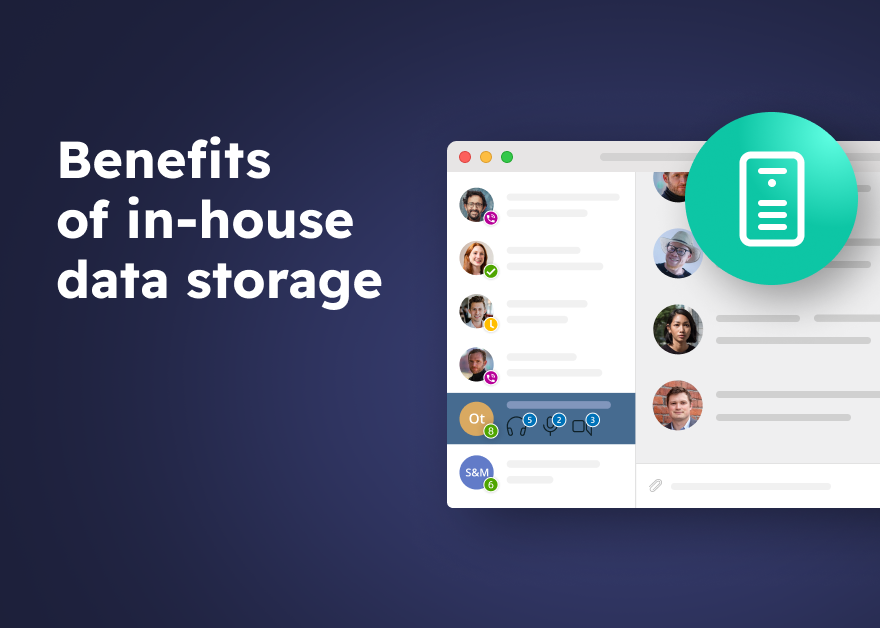Data security problem has recently become of the highest priority for business owners all over the globe. No matter whether your business is big or small, all issues related to data protection have become number one concern. IBM’s Cost of a Data Breach Report found that the average cost of a data breach is $3.86 million and moving in an upward trend. Thus, all measures for keeping company information safe should be taken. In this blog post we will discuss pros and cons of in-house data storage vs commercial clouds.
Pros and cons of in-house data storage
Self-hosting means installing, running and maintaining all the hardware locally, while cloud-hosting is about renting this service from a SaaS provider. Though hosting on-premise sounds scaring, there are a lot of advantages of the in-house data storage:
- Full control over data. This means that your critical data is kept in-house and cannot be accessed by third parties. You can also run everything behind your organization firewall and you do not need Internet connection to access your data;
- Compliance with security regulations and standards. You can easily comply with any data storage and data protection regulations when you host everything in-house;
- No unexpected ‘surprises’ from vendors. When you rely on your own resources, you should not worry about expired bills or limitations introduced by a vendor. In-house data storage makes you independent;
- Possibility to customize and integrate. You can control how your information is processed and stored without a necessity to follow vendor’s regulations;
- LAN is faster. You do not need Internet to access your data and thus the connection speed is higher.
Still, there are certain limitations you need to consider when switching to in-house data storage:
- Support and maintenance. Everything related to the servers’ maintenance and their support is your responsibility. This requires a specialist or a team of technicians, depending on the size of your in-house data center;
- There are certain limitations which require planning and depend on the capacity of the equipment if you need to increase data storage or add more users;
- Data recovery. You should take care of this yourself and make sure the back ups are made regularly.
In terms of cost effectiveness, it is not possible to say which data storage type is cheaper. Everything depends on your company size, the amount of data you store, hardware and the number of technicians you need to maintain and support your data center.
Cloud hosting
Storing your data in a cloud does not mean lack of security. There are a lot of advantages of the cloud hosting:
- You can set up everything up and running with a couple of clicks;
- There is no need to hire experts to maintain and support your cloud data storage, this service is already included into your cloud hosting fee;
- You can access your data from any corner of the world.
On the other side, you have no control over your data and government can get access to it.
For many businesses it is important to keep company information safe and protected against attempts to access it by third parties. This also implies internal company communication when internal information is shared on a daily basis among employees. However, it is possible to make this communication safe and protected against data breaches by using self-hosted corporate messenger.
Why your company needs self-hosted corporate messenger
Virola is not a simple self-hosted corporate messenger, it is a comprehensive collaboration tool for remote teams. It can be used not only for internal business communication but also for task management and conference calls. All information shared in chats will be stored on your servers and thus protected against access by third parties. With self-hosted corporate messenger there will be no data leaking and full control over your data. Virola collaboration tool offers the following features:
- Private and group chats;
- Conference calls;
- File sharing and remote control;
- Live avatars;
- Unlimited files storage;
- Intuitive search in chats;
- Tasks and issues tracking;
- Scrum board;
- Meetings scheduler;
- Messenger client for desktop and mobiles;
- Self-hosted corporate messenger.
With help of a corporate messenger, you can bring your teams together and let them share and discuss their work ideas in one place. If you want to make your teams productive, you should encourage using corporate messenger instead of private ones for internal business communication. On-premise business chat solution like Virola will help you quickly create productive communication environment for your teams.
- How many customer support agents do I need on live chat? - February 7, 2024
- Getting Started with Affiliate Marketing: Tips for Beginners - October 19, 2023
- Introducing Provide Support pricing update - October 10, 2023

